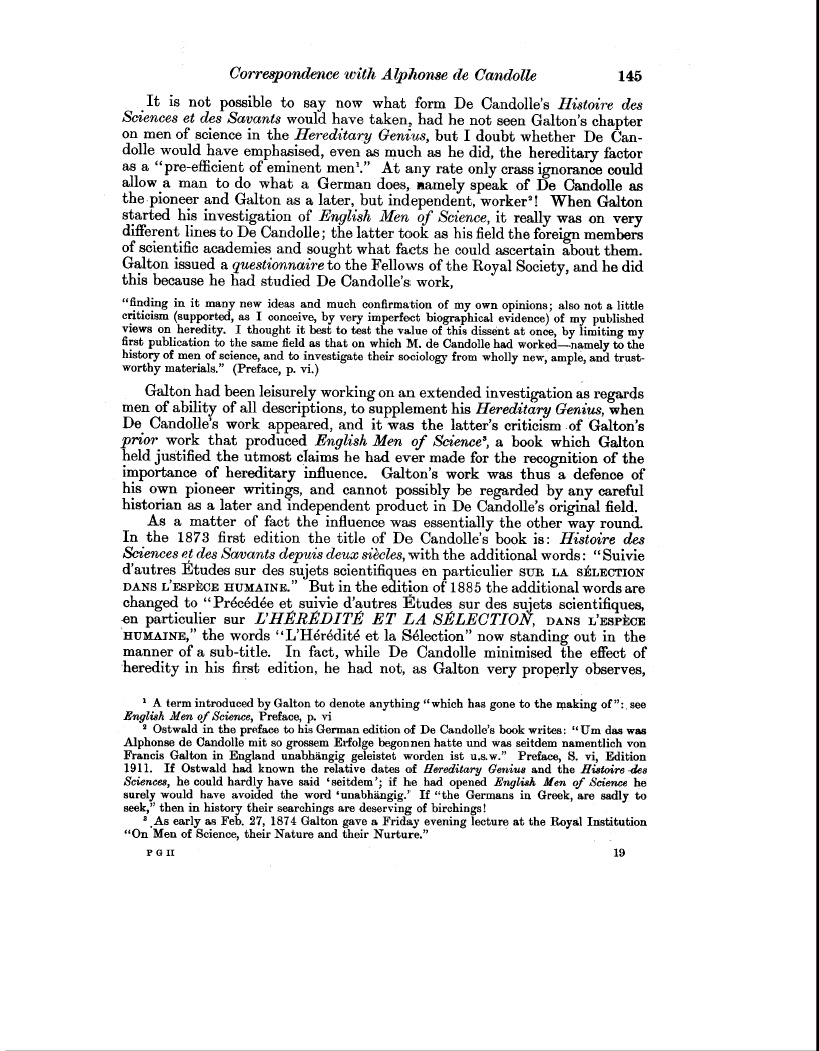Correspondence with Alphonse de Candolle 145
It is not possible to say now what form De Candolle's Histoire des Sciences et des Savants would have taken, had he not seen Galton's chapter on men of science in the Hereditary Genius, but I doubt whether De Candolle would have emphasised, even as much as he did, the hereditary factor as a "pre-efficient of eminent men'." At any rate only crass ignorance could allow a man to do what a German does, namely speak of De Candolle as the. pioneer and Galton as a later, but independent, worker'! When Galton started his investigation of English Men of Science, it really was on very different lines to De Candolle; the latter took as his field the foreign members of scientific academies and sought what facts he could ascertain about them. Galton issued a questionnaire to the Fellows of the Royal Society, and he did this because he had studied De Candolle's work,
"finding in it many new ideas and much confirmation of my own opinions; also not a little criticism (supported, as I conceive, by very imperfect biographical evidence) of my published views on heredity. I thought it best to test the value of this dissent at once, by limiting my
first publication to the same field as that on which M. de Candolle had worked-namely to the history of men of science, and to investigate their sociology from wholly new, ample, and trustworthy materials." (Preface, p. vi.)
Galton had been leisurely working on an extended investigation as regards men of ability of all descriptions, to supplement his Hereditary Genius, when De Candolle's work appeared, and it was the latter's criticism of Galton's prior work that produced English Men of Science', a book which Galton held justified the utmost claims he had ever made for the recognition of the importance of hereditary influence. Galton's work was thus a defence of his own pioneer writings, and cannot possibly be regarded by any careful historian as a later and independent product in De Candolle's original field.
As a matter of fact the influence was essentially the other way round. In the 1873 first edition the title of De Candolle's book is: Histoire des Sciences et des Savants depuis deux siecles, with the additional words: "Suivie d'autres Etudes sur des sujets scientifiques en particulier suit LA SELECTION DANS L'ESPECE HUMAINE." But in the edition of 1885 the additional words are changed to "Precedee et suivie d'autres Etudes sur des sujets scientifiques, .en particulier sur L'HEREDITE ET LA SELECTION, DANS L'ESPECE HUMAINE," the words "L'Heredite et la Selection" now standing out in the manner of a sub-title. In fact, while De Candolle minimised the effect of heredity in his first edition, he had not, as Galton very properly observes,
' A term introduced by Galton to denote anything "which has gone to the snaking of":. see English Men of Science, Preface, p. vi
2 Ostwald in the preface to his German edition of De Candolle's book writes: "Um das was Alphonse de Candolle mit so grossem Erfolge begonnen hatte and was seitdem namentlich von Francis Galton in England unabhangig geleistet worden ist u.s.w." Preface, S. vi, Edition 1911. If Ostwald had known the relative dates of Hereditary Genius and the Histoire des Sciences, he could hardly have said 'seitdem'; if he had opened English Men of Science he surely would have avoided the word °unabhangig.' If "the Germans in Greek, are sadly to seek," then in history their searchings are deserving of birchings!
3 As early as Feb. 27, 1874 Galton gave a Friday evening lecture at the Royal Institution "On Men of Science, their Nature and their Nurture."
P G II 19

